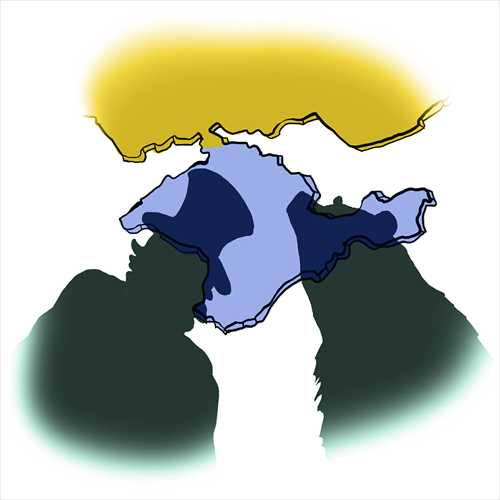Isolation over Crimea intervention may turn Russia toward Asia-Pacific

Illustration: Liu Rui/GT
The latest development in Ukraine, especially in Crimea in the south of the country, has made headlines worldwide.
Ukraine has a deep division between its east and west. The division is so deep that the population has different national heroes. Stepan Bandera and Roman Shukhevych, who fought against the Soviet Army during WWII are regarded as national heroes in the west of Ukraine, while for people in the east and south they are traitors and Nazi collaborators.
The people in the west of Ukraine look at the association with the EU as a step to future membership in the organization and an attempt to break away from the "Russian empire." The people in the east and south would like to have close relations with the EU, but not at the expense of relations with Russia.
The toppling of former Ukrainian president Viktor Yanukovych was welcomed in the west and was not resisted in other parts of Ukraine, because Yanukovych and his team were regarded as corrupt and inefficient.
Today the country is facing economic bankruptcy. However, the current leaders belonging to both moderate and radical nationalist parties, instead of dealing with the most urgent task to restore the management of the country and economic stability, passed a law saying that Russian was no longer one of the national languages.
This has given a threatening signal to the Russian-speaking population. And the new authorities have begun to persecute its opposition for political reasons. The new leaders forgot that people living in glass houses shouldn't throw stones.
The Russian-speaking population in Crimea was especially worried about the possibility of being harassed by the Ukrainian nationalists.
The decision of Russia's upper house of parliament to authorize President Vladimir Putin to use military force on the territory of Ukraine shocked many leaders and public at large. Will Russia try to occupy Ukraine or to change the regime in Kiev?
Although the current Ukrainian authorities can hardly be called legitimate, as they came to power after a coup d'etat, it is not in Russia's interest to change the regime or to destabilize the situation in Ukraine for a number of reasons.
The two countries have close economic ties and any destabilization will affect both economies. Russia has already bought Ukrainian eurobonds of $3 billion. Ukraine has a growing debt of $1.5 billion for Russian gas and the sum may reach $10 billion by the end of 2014. Russia is interested in Ukraine's capability to pay off debts and to preserve mutually beneficial economic cooperation.
Nobody wants bloodshed because of a possible humanitarian disaster. The uncontrollable refugee flow to Russia has already begun. Russian local authorities in the region next to Ukraine claim that more than 140,000 Ukrainians crossed the border during the past two weeks and are seeking refuge in Russia.
A protracted conflict would also pull together all anti-Russian forces in and around Ukraine and speed up Ukraine moving toward NATO membership. Besides, any military escalation will be strongly opposed by the Western community, so Russia may find itself under tough sanctions and in isolation as it happened during the military conflict with Georgia over South Ossetia in the Caucasus in 2008.
Finally, all sober-minded forces involved in and outside Ukraine have a common desire to forestall any spread of violence.
The situation is changing very fast and is unpredictable. What is possible to do now is to outline the possible trajectories of the future development.
It is highly unlikely that Russia will annex Crimea and will make it a part of Russia. It is not likely either that Crimea will remain Ukrainian. The most likely scenario is Crimean independence.
Crimean authorities intend to hold a referendum which will decide the fate of the republic. Most probably it will follow the way of Abkhazia and South Ossetia in the Caucasus, which claim independence but are not internationally recognized outside of Russia and a few others.
Western leaders have threatened to impose sanctions against Russia. This increasing pressure will step up Russia's desire to rebalance its strategy toward the Asia-Pacific region. Cooperation with countries like China will be even more valuable for Russia.
The author is chair of the Political Science Department at the Diplomatic Academy in Moscow. opinion@globaltimes.com.cn